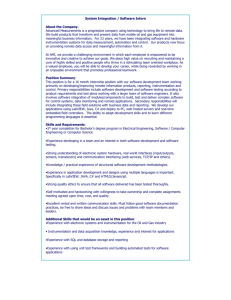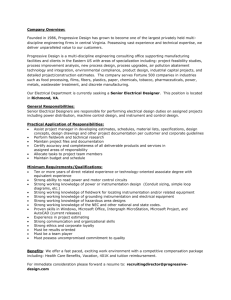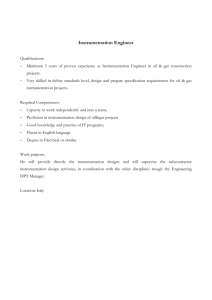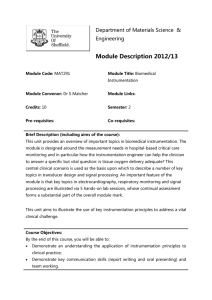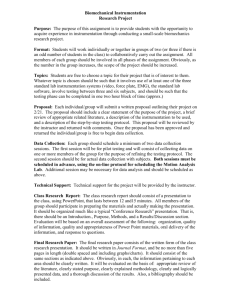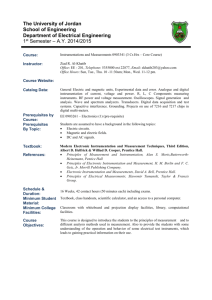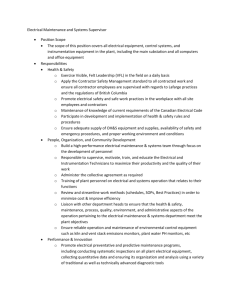EE426: Fundamentals of Electronic Instrumentation Assoc. Prof. Samara Firebaugh il:
advertisement
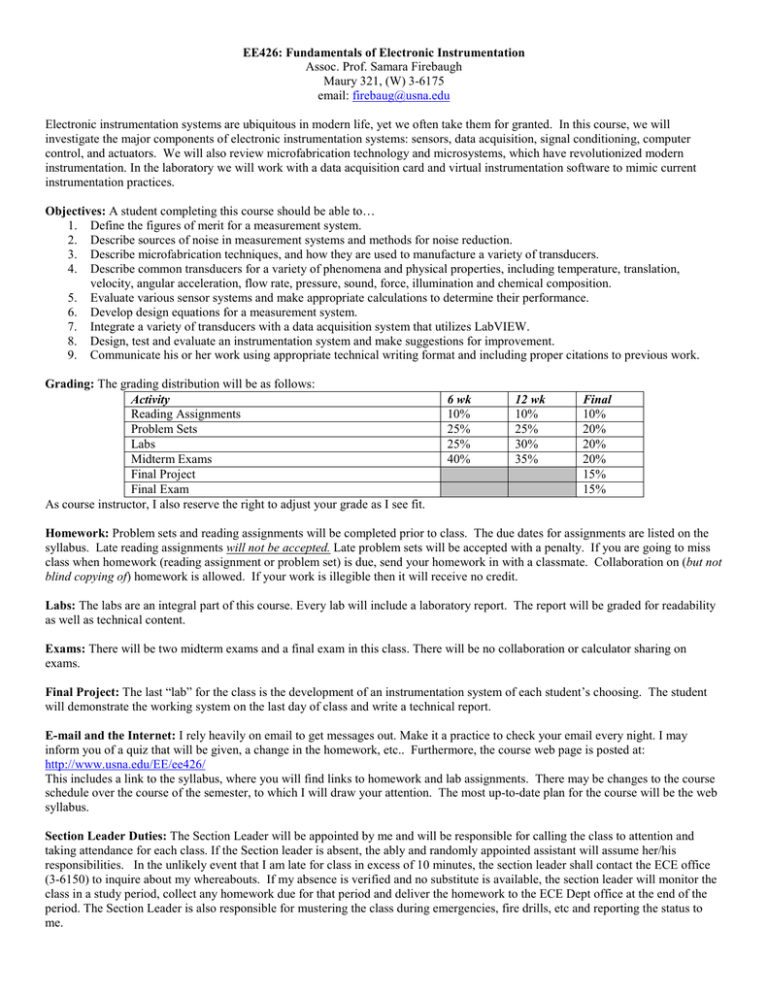
EE426: Fundamentals of Electronic Instrumentation Assoc. Prof. Samara Firebaugh Maury 321, (W) 3-6175 email: firebaug@usna.edu Electronic instrumentation systems are ubiquitous in modern life, yet we often take them for granted. In this course, we will investigate the major components of electronic instrumentation systems: sensors, data acquisition, signal conditioning, computer control, and actuators. We will also review microfabrication technology and microsystems, which have revolutionized modern instrumentation. In the laboratory we will work with a data acquisition card and virtual instrumentation software to mimic current instrumentation practices. Objectives: A student completing this course should be able to… 1. Define the figures of merit for a measurement system. 2. Describe sources of noise in measurement systems and methods for noise reduction. 3. Describe microfabrication techniques, and how they are used to manufacture a variety of transducers. 4. Describe common transducers for a variety of phenomena and physical properties, including temperature, translation, velocity, angular acceleration, flow rate, pressure, sound, force, illumination and chemical composition. 5. Evaluate various sensor systems and make appropriate calculations to determine their performance. 6. Develop design equations for a measurement system. 7. Integrate a variety of transducers with a data acquisition system that utilizes LabVIEW. 8. Design, test and evaluate an instrumentation system and make suggestions for improvement. 9. Communicate his or her work using appropriate technical writing format and including proper citations to previous work. Grading: The grading distribution will be as follows: Activity Reading Assignments Problem Sets Labs Midterm Exams Final Project Final Exam As course instructor, I also reserve the right to adjust your grade as I see fit. 6 wk 10% 25% 25% 40% 12 wk 10% 25% 30% 35% Final 10% 20% 20% 20% 15% 15% Homework: Problem sets and reading assignments will be completed prior to class. The due dates for assignments are listed on the syllabus. Late reading assignments will not be accepted. Late problem sets will be accepted with a penalty. If you are going to miss class when homework (reading assignment or problem set) is due, send your homework in with a classmate. Collaboration on (but not blind copying of) homework is allowed. If your work is illegible then it will receive no credit. Labs: The labs are an integral part of this course. Every lab will include a laboratory report. The report will be graded for readability as well as technical content. Exams: There will be two midterm exams and a final exam in this class. There will be no collaboration or calculator sharing on exams. Final Project: The last “lab” for the class is the development of an instrumentation system of each student’s choosing. The student will demonstrate the working system on the last day of class and write a technical report. E-mail and the Internet: I rely heavily on email to get messages out. Make it a practice to check your email every night. I may inform you of a quiz that will be given, a change in the homework, etc.. Furthermore, the course web page is posted at: http://www.usna.edu/EE/ee426/ This includes a link to the syllabus, where you will find links to homework and lab assignments. There may be changes to the course schedule over the course of the semester, to which I will draw your attention. The most up-to-date plan for the course will be the web syllabus. Section Leader Duties: The Section Leader will be appointed by me and will be responsible for calling the class to attention and taking attendance for each class. If the Section leader is absent, the ably and randomly appointed assistant will assume her/his responsibilities. In the unlikely event that I am late for class in excess of 10 minutes, the section leader shall contact the ECE office (3-6150) to inquire about my whereabouts. If my absence is verified and no substitute is available, the section leader will monitor the class in a study period, collect any homework due for that period and deliver the homework to the ECE Dept office at the end of the period. The Section Leader is also responsible for mustering the class during emergencies, fire drills, etc and reporting the status to me. Plagiarism and the Honor Concept: I will hold you accountable to the highest standards for professional conduct. All coursework should be yours alone or should have proper attribution. Figures or information that is borrowed from other sources, including the internet, should be labeled with the source citation in reports and in presentations. The instructor will discuss examples of plagiarism on the first day of class. Calculators: For calculator use in Electrical and Computer Engineering (ECE) courses taught to engineers, it is the policy of the ECE Department to only allow calculators that have been approved for the Fundamentals of Engineering Exam (FE). Acceptable calculators are listed at: http://www.ncees.org/Exams/Exam-day_policies/Calculator_policy.php. These run in price as low as $15, and are required for all ECE Department courses.
